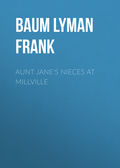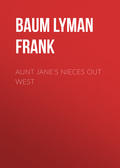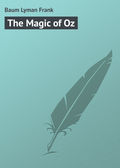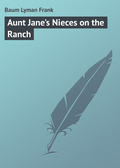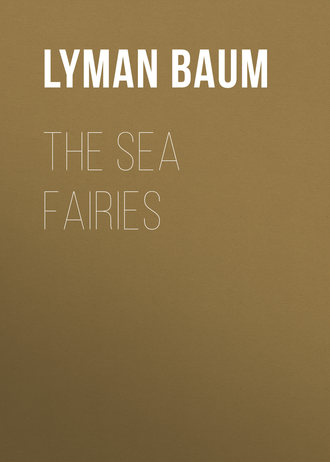
Лаймен Фрэнк Баум
The Sea Fairies
6
Exploring the Ocean
The queen now requested her guests to recline upon couches, that they might rest themselves from their long swim and talk more at their ease. So the girl and the sailor allowed themselves to float downward until they rested their bodies on two of the couches nearest the throne, which were willingly vacated for them by the mermaids who had occupied them until then.
The visitors soon found themselves answering a great many questions about their life on the earth, for, although the queen had said she kept track of what was going on on the land, there were many details of human life in which all the mermaids seemed greatly interested.
During the conversation several sea-maids came swimming into the room, bearing trays of sea apples and other fruit, which they first offered to the queen and then passed the refreshments around to the company assembled. Trot and Cap'n Bill each took some, and the little girl found the fruits delicious to eat, as they had a richer flavor than any that grew upon land. Queen Aquareine was much pleased when the old sailor asked for more, but Merla warned him dinner would soon be served and he must take care not to spoil his appetite for that meal.
"Our dinner is at noon, for we have to cook in the middle of the day, when the sun is shining," she said.
"Cook!" cried Trot; "why, you can't build a fire in the water, can you?"
"We have no need of fires," was the reply. "The glass roof of our kitchen is so curved that it concentrates the heat of the sun's rays, which are then hot enough to cook anything we wish."
"But how do you get along if the day is cloudy, and the sun doesn't shine?" inquired the little girl.
"Then we use the hot springs that bubble up in another part of the palace," Merla answered. "But the sun is the best to cook by."
So, it was no surprise to Trot when, about noon, dinner was announced and all the mermaids, headed by their queen and their guests, swam into another spacious room where a great, long table was laid. The dishes were of polished gold and dainty cut glass, and the cloth and napkins of fine gossamer. Around the table were ranged rows of couches for the mermaids to recline upon as they ate. Only the nobility and favorites of Queen Aquareine were invited to partake of this repast, for Clia explained that tables were set for the other mermaids in different parts of the numerous palaces.
Trot wondered who would serve the meal, but her curiosity was soon satisfied when several large lobsters came sliding into the room, backward, bearing in their claws trays loaded with food. Each of these lobsters had a golden band around its neck to show it was the slave of the mermaids.
These curious waiters were fussy creatures and Trot found much amusement in watching their odd motions. They were so spry and excitable that, at times, they ran against one another and upset the platters of food, after which they began to scold and argue as to whose fault it was, until one of the mermaids quietly rebuked them and asked them to be more quiet and more careful.
The queen's guests had no cause to complain of the dinner provided. First the lobsters served bowls of turtle soup, which proved hot and deliciously flavored. Then came salmon steaks fried in fish oil, with a fungus bread that tasted much like field mushrooms. Oysters, clams, soft-shell crabs and various preparations of sea foods followed. The salad was a delicate leaf from some seaweed that Trot thought was much nicer than lettuce. Several courses were served and the lobsters changed the plates with each course, chattering and scolding as they worked, and as Trot said, "doing everything backwards" in their nervous, fussy way.
Many of the things offered them to eat were unknown to the visitors, and the child was suspicious of some of them; but Cap'n Bill asked no questions and ate everything offered him, so Trot decided to follow his example. Certain it is they found the meal very satisfying, and evidently there was no danger of their being hungry while they remained the guests of the mermaids. When the fruits came, Trot thought that must be the last course of the big dinner, but, following the fruits were ice creams frozen into the shapes of flowers.
"How funny," said the child, "to be eating ice cream at the bottom of the sea!"
"Why does that surprise you?" inquired the Queen.
"I can't see where you get the ice to freeze it," Trot replied.
"It is brought to us from the icebergs that float in the northern parts of the ocean," explained Merla.
"O' course, Trot; you orter thought o' that; I did," said Cap'n Bill.
The little girl was glad there was no more to eat, for she was ashamed to feel she had eaten every morsel she could. Her only excuse for being so greedy was that "ev'rything tasted just splendid!" as she told the queen.
"And now," said Aquareine, "I will send you out for a swim with Merla, who will show you some of the curious sights of our sea. You need not go far this afternoon, and when you return we will have another interesting talk together."
So the blonde mermaid led Trot and Cap'n Bill outside the palace walls, where they found themselves in the pretty flower gardens.
"I'd feel all right, mate, if I could have a smoke," remarked the old sailor to the child; "but that's a thing as can't be did here in the water."
"Why not?" asked Merla, who overheard him.
"A pipe has to be lighted, an' a match wouldn't burn," he replied.
"Try it," suggested the mermaid. "I do not mind your smoking at all, if it will give you pleasure."
"It's a bad habit I've got, an' I'm too old to break myself of it," said Cap'n Bill. Then he felt in the big pockets of his coat and took out a pipe and a bag of tobacco. After he had carefully filled his pipe, rejoicing in the fact that the tobacco was not at all wet, he took out his match box and struck a light. The match burned brightly and soon the sailor was puffing the smoke from his pipe in great contentment. The smoke ascended through the water in the shape of bubbles and Trot wondered what anyone who happened to be floating upon the surface of the ocean would think to see smoke coming from the water.
"Well, I find I can smoke, all right," remarked Cap'n Bill; "but it bothers me to understand why."
"It is because of the air space existing between the water and everything you have about you," explained Merla. "But now, if you will come this way, I will take you to visit some of our neighbors."
They passed over the carpet of sea flowers, the gorgeous blossoms swaying on their stems as the motion of the people in the water above them disturbed their repose, and presently the three entered the dense shrubbery surrounding the palaces. They had not proceeded far when they came to a clearing among the bushes, and here Merla paused.
Trot and Cap'n Bill paused, too, for floating in the clear water was a group of beautiful shapes that the child thought looked like molds of wine jelly. They were round as a dinner plate, soft and transparent, but tinted in such lovely hues that no artist's brush has ever been able to imitate them. Some were deep sapphire blue; others rose pink; still others a delicate topaz color. They seemed to have neither heads, eyes nor ears, yet it was easy to see they were alive and able to float in any direction they wished to go. In shape they resembled inverted flowerpots, with the upper edges fluted, and from the centers floated what seemed to be bouquets of flowers.
"How pretty!" exclaimed Trot, enraptured by the sight.
"Yes; this is a rare variety of jellyfish," replied Merla. "The creatures are not so delicate as they appear, and live for a long time – unless they get too near the surface and the waves wash them ashore."
After watching the jellyfish a few moments they followed Merla through the grove and soon a low chant, like that of an Indian song, fell upon their ears. It was a chorus of many small voices, and grew louder as they swam on. Presently a big rock rose suddenly before them from the bottom of the sea, rearing its steep side far up into the water overhead, and this rock was thickly covered with tiny shells that clung fast to its surface. The chorus they heard appeared to come from these shells, and Merla said to her companions:
"These are the singing barnacles. They are really very amusing, and if you listen carefully you can hear what they say."
So Trot and Cap'n Bill listened, and this was what the barnacles sang:
"We went to topsy-turvy land to see a man-o'-war,
And we were much attached to it, because we simply were;
We found an anchor-ite within the mud upon the lea
For the ghost of Jonah's whale he ran away and went to sea.
Oh, it was awful!
It was unlawful!
We rallied round the flag in sev'ral millions;
They couldn't shake us;
They had to take us;
So the halibut and cod they danced cotillions."
"What does it all mean?" asked Trot.
"I suppose they refer to the way barnacles have of clinging to ships," replied Merla; "but usually their songs mean nothing at all. The little barnacles haven't many brains, so we usually find their songs quite stupid."
"Do they write comic operas?" asked the child.
"I think not," answered the mermaid.
"They seem to like the songs themselves," remarked Cap'n Bill.
"Oh, yes; they sing all day long. But it never matters to them whether their songs mean anything or not. Let us go in this direction and visit some other sea people."
So they swam away from the barnacle-covered rock and Trot heard the last chorus as she slowly followed their conductor. The barnacles were singing:
"Oh, very well, then,
I hear the curfew,
Please go away and come some other day;
Goliath tussels
With Samson's muscles,
Yet the muscles never fight in Oyster Bay."
"It's jus' nonsense!" said Trot, scornfully. "Why don't they sing 'Annie Laurie,' or 'Home, Sweet Home,' or else keep quiet?"
"Why, if they were quiet," replied Merla, "they wouldn't be singing barnacles."
They now came to one of the avenues which led from the sea garden out into the broad ocean, and here two swordfishes were standing guard.
"Is all quiet?" Merla asked them.
"Just as usual, your Highness," replied one of the guards. "Mummercubble was sick this morning, and grunted dreadfully; but he's better now and has gone to sleep. King Anko has been stirring around some, but is now taking his after-dinner nap. I think it will be perfectly safe for you to swim out for a while, if you wish."
"Who's Mummercubble?" asked Trot, as they passed out into deep water.
"He's the sea pig," replied Merla. "I am glad he is asleep, for now we won't meet him."
"Don't you like him?" inquired Trot.
"Oh, he complains so bitterly of everything that he bores us," Merla answered. "Mummercubble is never contented or happy for a single minute."
"I've seen people like that," said Cap'n Bill, with a nod of his head; "an' they has a way of upsettin' the happiest folks they meet."
"Look out!" suddenly cried the mermaid. "Look out for your fingers! Here are the snapping eels."
"Who? Where?" asked Trot, anxiously.
And now, they were in the midst of a cluster of wriggling, darting eels which sported all around them in the water with marvelous activity.
"Yes, look out for your fingers and your noses!" said one of the eels, making a dash for Cap'n Bill. At first the sailor was tempted to put out a hand and push the creature away, but remembering that his fingers would thus be exposed he remained quiet, and the eel snapped harmlessly just before his face, and then darted away.
"Stop it!" said Merla; "stop it this minute, or I'll report your impudence to Aquareine."
"Oh, who cares?" shouted the Eels. "We're not afraid of the mermaids."
"She'll stiffen you all up again, as she did once before," said Merla, "if you try to hurt the earth people."
"Are these earth people?" asked one. And then they all stopped their play and regarded Trot and Cap'n Bill with their little black eyes.
"The old polliwog looks something like King Anko," said one of them.
"I'm not a polliwog!" answered Cap'n Bill, angrily. "I'm a re-spec'able sailorman, an' I'll have you treat me decent or I'll know why."
"Sailor!" said another. "That means to float on the water – not in it. What are you doing down here?"
"I'm jes' a-visitin'," answered Cap'n Bill.
"He is the guest of our queen," said Merla, "and so is this little girl. If you do not behave nicely to them you will surely be sorry."
"Oh, that's all right," replied one of the biggest eels, wriggling around in a circle and then snapping at a companion, which as quickly snapped out of his way. "We know how to be polite to company as well as the mermaids. We won't hurt them."
"Come on, fellows; let's go scare old Mummercubble," cried another; and then in a flash, they all darted away and left our friends to themselves.
Trot was greatly relieved.
"I don't like eels," she said.
"They are more mischievous than harmful," replied Merla; "but I do not care much for them myself."
"No," added Cap'n Bill; "they ain't respec'ful."
7
The Aristocratic Codfish
The three swam slowly along, quite enjoying the cool depths of the water. Every little while they met with some strange creature – or one that seemed strange to the earth people – for although Trot and Cap'n Bill had seen many kinds of fish, after they had been caught and pulled from the water, that was very different from meeting them in their own element, "face to face," as Trot expressed it. Now that the various fishes were swimming around free and unafraid in their deep-sea home, they were quite different from the gasping, excited creatures struggling at the end of a fishline, or flopping from a net.
Before long they came upon a group of large fishes lying lazily near the bottom of the sea. They were a dark color upon their backs and silver underneath, but not especially pretty to look at. The fishes made no effort to get out of Merla's way and remained motionless, except for the gentle motion of their fins and gills.
"Here," said the mermaid, pausing, "is the most aristocratic family of fish in all the sea."
"What are they?" asked the girl.
"Codfish," was the reply. "Their only fault is that they are too haughty and foolishly proud of their pedigree."
Overhearing this speech one codfish said to another, in a very dignified tone of voice: "What insolence!"
"Isn't it?" replied the other. "There ought to be a law to prevent these common mermaids from discussing their superiors."
"My sakes!" said Trot, astonished; "how stuck up they are, aren't they?"
For a moment the group of fishes stared at her solemnly. Then one of them remarked in a disdainful manner:
"Come, my dears, let us leave these vulgar creatures."
"I'm not as vulgar as you are!" exclaimed Trot, much offended by this speech. "Where I came from we only eat codfish when there's nothing else in the house to eat."
"How absurd!" observed one of the creatures, arrogantly.
"Eat codfish, indeed!" said another in a lofty manner.
"Yes, and you're pretty salty, too, I can tell you. At home you're nothing but a pick-up!" said Trot.
"Dear me!" exclaimed the first fish which had spoken; "must we stand this insulting language – and from a person to whom we have never been introduced?"
"I don't need any interduction," replied the girl; "I've eaten you, and you always make me thirsty."
Merla laughed merrily at this, and the codfish said, with much dignity:
"Come, fellow aristocrats; let us go."
"Never mind; we're going ourselves," announced Merla, and followed by her guests the pretty mermaid swam away.
"I've heard tell of codfish aristocercy," said Cap'n Bill; "but I never knowed 'zac'ly what it meant afore."
"They jus' made me mad, with all their airs," observed Trot; "so I gave 'em a piece of my mind."
"You surely did, mate," said the sailor; "but I ain't sure they understand what they're like when they're salted an' hung up in the pantry. Folks gener'ly gets stuck-up 'cause they don't know theirselves like other folks knows 'em."
"We are near Crabville now," declared Merla. "Shall we visit the crabs and see what they are doing?"
"Yes, let's," replied Trot. "The crabs are lots of fun. I've often caught them among the rocks on the shore and laughed at the way they act. Wasn't it funny at dinner time to see the way they slid around with the plates?"
"Those were not crabs, but lobsters and crawfish," remarked the mermaid. "They are very intelligent creatures, and by making them serve us we save ourselves much household work. Of course, they are awkward and provoke us sometimes; but no servants are perfect, it is said, so we get along with ours as well as we can."
"They're all right," protested the child, "even if they did tip things over once in a while. But it is easy to work in a sea palace, I'm sure, because there's no dusting or sweeping to be done."
"Or scrubbin'," added Cap'n Bill.
"The crabs," said Merla, "are second cousins to the lobsters, although much smaller in size. There are many families – or varieties – of crabs, and so many of them live in one place near here that we call it Crabville. I think you will enjoy seeing these little creatures in their native haunts."
They now approached a kelp bed, the straight, thin stems of the kelp running far upward to the surface of the water. Here and there upon the stalks were leaves, but Trot thought the growing kelp looked much like sticks of macaroni, except they were a rich, red-brown color.
It was beyond the kelp – which they had to push aside as they swam through it, so thickly did it grow – that they came to a higher level, a sort of plateau on the ocean's bottom. It was covered with scattered rocks of all sizes, which appeared to have broken off from big shelving rocks they observed near by. The place they entered seemed like one of the rocky canyons you often see upon the earth.
"Here live the fiddler crabs," said Merla; "but we must have taken them by surprise, it is so quiet."
Even as she spoke there was a stirring and scrambling among the rocks, and soon scores of light green crabs were gathered before the visitors. The crabs bore fiddles of all sorts and shapes in their claws, and one big fellow carried a leader's baton. The latter crab climbed upon a flat rock and in an excited voice called out:
"Ready, now – ready, good fiddlers. We'll play Number 19 – Hail to the Mermaids. Ready! Take aim! Fire away!"
At this command every crab began scraping at his fiddle as hard as he could, and the sounds were so shrill and unmusical that Trot wondered when they would begin to play a tune. But they never did; it was one regular mix-up of sounds from beginning to end. When the noise finally stopped the leader turned to his visitors and, waving his baton toward them, asked:
"Well, what do you think of that?"
"Not much," said Trot, honestly. "What's it all about?"
"I composed it myself!" said the Fiddler Crab. "But it's highly classical, I admit. All really great music is an acquired taste."
"I don't like it," remarked Cap'n Bill. "It might do all right to stir up a racket New Year's Eve, but to call that screechin' music – "
Just then the crabs started fiddling again, harder than ever, and as it promised to be a long performance they left the little creatures scraping away at their fiddles, as if for dear life, and swam along the rocky canyon until, on turning a corner, they came upon a new and different scene.
There were crabs here, too – many of them – and they were performing the queerest antics imaginable. Some were building themselves into a pyramid, each standing on edge, with the biggest and strongest ones at the bottom. When the crabs were five or six rows high they would all tumble over, still clinging to one another, and, having reached the ground, they would separate and commence to build the pyramid over again.
Others were chasing one another around in a circle, always moving backward or sidewise, and trying to play "leapfrog" as they went. Still others were swinging on slight branches of seaweed, or turning cart wheels, or indulging in similar antics.
Merla and the earth people watched the busy little creatures for some time before they were themselves observed; but finally, Trot gave a laugh when one crab fell on its back and began frantically waving its legs to get right-side-up again. At the sound of her laughter they all stopped their play and came toward the visitors in a flock, looking up at them with their bright eyes in a most comical way.
"Welcome home!" cried one, as he turned a back somersault and knocked another crab over.
"What's the difference between a mermaid and a tadpole?" asked another, in a loud voice, and without a pause continued: "why, one drops its tail and the other holds on to it. Ha, ha! Ho, ho! Hee-hee!"
"These," said Merla, "are the clown crabs. They are very silly things, as you may already have discovered; but for a short time they are rather amusing. One tires of them very soon."
"They're funny," said Trot, laughing again. "It's almost as good as a circus. I don't think they would make me tired; but, then, I'm not a mermaid."
The clown crabs had now formed a row in front of them.
"Mr. Johnsing," asked one, "why is a mermaid like an automobile?"
"I don't know, Tommy Blimken," answered a big crab in the middle of the row. "Why do you think a mermaid is like an automobile?"
"Because they both get tired," said Tommy Blimken. Then all the crabs laughed, and Tommy seemed to laugh louder than the rest.
"How do the crabs in the sea know anything 'bout auto'biles?" asked Trot.
"Why, Tommy Blimken and Harry Hustle were both captured once by humans and put in an aquarium," answered the mermaid. "But one day they climbed out and escaped, finally making their way back to the sea and home again. So they are quite traveled you see, and great favorites among the crabs. While they were on land they saw a great many curious things, and so I suppose they saw automobiles."
"We did, we did!" cried Harry Hustle, an awkward crab with one big claw and one little one. "And we saw earth people with legs – awfully funny they were; and animals called horses, with legs; and other creatures with legs; and the people cover themselves with the queerest things – they even wear feathers and flowers on their heads, and – "
"Oh, we know all about that," said Trot; "we live on the earth ourselves."
"Well, you're lucky to get off from it and into the good water," said the Crab. "I nearly died on the earth; it was so stupid, dry and airy. But the circus was great. They held the performance right in front of the aquarium where we lived, and Tommy and I learned all the tricks of the tumblers. Hi! Come on, fellows, and show the earth people what you can do!"
At this the crabs began performing their antics again; but they did the same things over and over, so Cap'n Bill and Trot soon tired, as Merla said they would, and decided they had seen enough of the crab circus. So they proceeded to swim farther up the rocky canyon, and near its upper end they came to a lot of conch shells lying upon the sandy bottom. A funny looking crab was sticking his head out from each of these shells.
"Here are the hermit crabs," said one of the mermaids. "They steal these shells and live in them, so no enemies can attack them."
"Don't they get lonesome?" asked Trot.
"Perhaps so, my dear. But they do not seem to mind being lonesome. They are great cowards, and think if they can but protect their lives there is nothing else to care for. Unlike the jolly crabs we have just left, the hermits are cross and unsociable."
"Oh, keep quiet and go away!" said one of the hermit crabs, in a grumpy voice. "No one wants mermaids around here." Then every crab withdrew its head into its shell, and our friends saw them no more.
"They're not very polite," observed Trot, following the mermaid as Merla swam upward into the middle water.
"I know, now, why cross people are called 'crabbed'," said Cap'n Bill. "They've got dispositions jes' like these 'ere hermit crabs."
Presently, they came upon a small flock of mackerel, and noticed that the fishes seemed much excited. When they saw the mermaid they cried out:
"Oh, Merla! what do you think? Our Flippity has just gone to glory!"
"When?" asked the mermaid.
"Just now," one replied. "We were lying in the water, talking quietly together when a spinning, shining thing came along and our dear Flippity ate it. Then he went shooting up to the top of the water and gave a flop and – went to glory! Isn't it splendid, Merla?"
"Poor Flippity!" sighed the mermaid. "I'm sorry, for he was the prettiest and nicest mackerel in your whole flock."
"What does it mean?" asked Trot. "How did Flippity go to glory?"
"Why, he was caught by a hook, and pulled out of the water into some boat," Merla explained. "But these poor, stupid creatures do not understand that; and when one of them is jerked out of the water and disappears they have an idea he has gone to glory – which means to them some unknown, but beautiful sea."
"I've often wondered," said Trot, "why fishes are foolish enough to bite on hooks."
"They must know enough to know they're hooks," added Cap'n Bill, musingly.
"Oh, they do," replied Merla. "I've seen fishes gather around a hook and look at it carefully for a long time. They well know it is a hook, and that if they bite the bait upon it they will be pulled out of the water. But they are curious to know what will happen to them afterward, and think it means happiness, instead of death. So finally, one takes the hook and disappears, and the others never know what becomes of him."
"Why don't you tell 'em the truth?" asked Trot.
"Oh, we do. The mermaids have warned them many times, but it does no good at all. The fish are stupid creatures."
"But I wish I was Flippity," said one of the mackerel, staring at Trot with his big, round eyes. "He went to glory before I could eat the hook myself."
"You're lucky," answered the child. "Flippity will be fried in a pan for some one's dinner. You wouldn't like that, would you?"
"Flippity has gone to glory!" said another, and then they swam away in haste to tell the news to all they met.
"I never heard of anything so foolish," remarked Trot, as they swam slowly on through the clear blue water.
"Yes; it is very foolish, and very sad," answered Merla. "But, if the fishes were wise, men could not catch them for food, and many poor people on your earth make their living by fishing."
"It seems wicked to catch such pretty things," said the child.
"I do not think so," Merla replied, laughingly; "for they were born to become food for some one, and men are not the only ones that eat fishes. Many creatures of the sea feed upon them. They even eat one another, at times. And if none was ever destroyed they would soon become so numerous that they would clog the waters of the ocean, and leave no room for the rest of us. So, after all, perhaps it is just as well they are thoughtless and foolish."
Presently they came to some round balls that looked much like balloons in shape and were gaily colored. They floated quietly in the water, and Trot inquired what they were.
"Balloonfish," answered Merla. "They are helpless creatures, but have little spikes all over them, so their enemies dare not bite them for fear of getting pricked."
Trot found the balloonfish quite interesting. They had little dots of eyes and dots for mouths; but she could see no noses, and their fins and tails were very small.
"They catch these fish in the South Sea Islands and make lanterns of 'em," said Cap'n Bill. "They first skin 'em, and sew the skin up again to let it dry, and then they put candles inside and the light shines through the dried skin."
Many other curious sights they saw in the ocean that afternoon, and both Cap'n Bill and Trot thoroughly enjoyed their glimpse of sea life. At last Merla said it was time to return to the palace, from which she claimed they had not, at any time, been very far distant.
"We must prepare for dinner, as it will soon begin to grow dark in the water," continued their conductor. So they swam leisurely back to the groves that surrounded the palaces, and as they entered the gardens the sun sank, and deep shadows began to form in the ocean depths.



